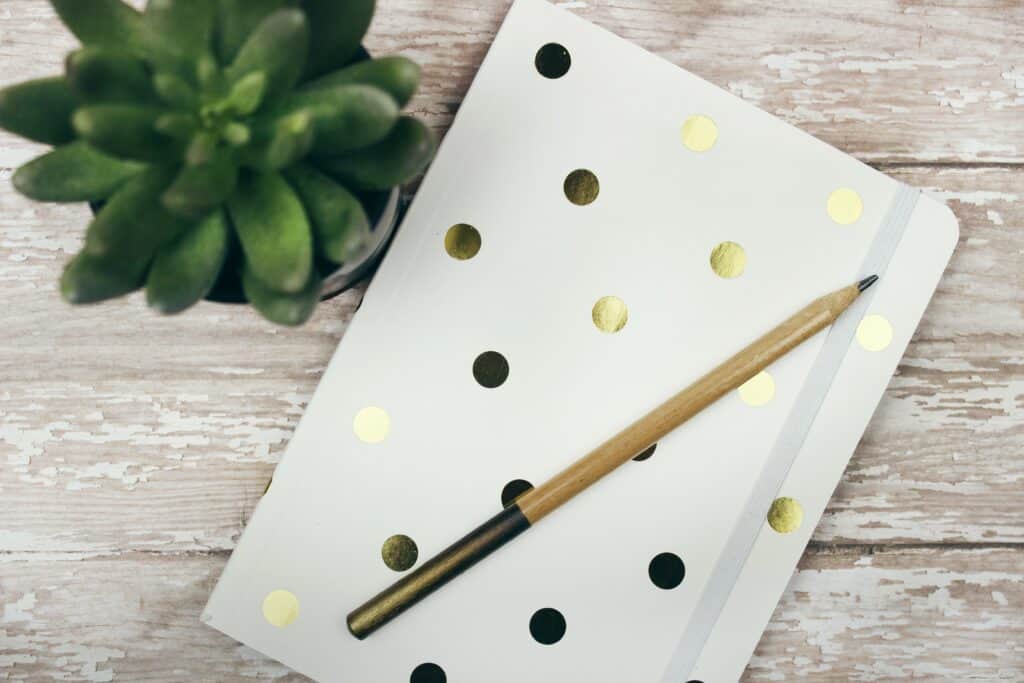
You might already know what journaling is and maybe have dabbled in a bit of journaling yourself. If you are new to journaling, it is the practice of writing down thoughts, feelings, memories, ideas or goals onto paper (or digital notebook). It can be daily, weekly or monthly depending on your preference and schedule.
Maybe you haven’t tried journaling yet because you’re not sure if you will gain any benefit from it. As a mom who journals, I can attest that it can bring many benefits. Even journaling on occasion can still be beneficial.
Journaling is personal and you can write however and whatever you like. No need to be a fancy writer or feel you have to be insanely creative to do it. It is not a practice of perfection. It is a practice of self-growth and reflection. Anyone can be successful at journaling, I assure you.
Let’s dive into journaling a bit deeper and discover the different types of journals that will fit your lifestyle and goals. I’ll cover methods and strategies that can help you accomplish those goals. As well as some tools and resources that can give your journaling a boost when you need it.
More on why you should journal…
If my introduction to journaling wasn’t enticing enough, here are a few reasons why you should journal.
- It can bring clarity in your life.
- It can help you be more mindful.
- It can help you be more aware of yourself and your situation.
- It can help you make sense of issues that are bothering you.
- It can help you unload mental garbage that’s getting in your way.
- It can help rid you of negative thoughts and worries.
- It can help you think more positively and focus on the positive.
- It can help you heal from an unfortunate/traumatic event.
The list can go on. Just the act of writing in a journal has the potential to do all these things. Amazing isn’t it? All you need is a pen and a notebook to get started. No need for anything fancy, something plain and simple will do.
You will see how powerful journaling is, how therapeutic and life changing it can be.
What is journaling?
Let’s start with what a journal is. It can also be called a diary. While journaling can be very similar to a diary, it dives deeper. A diary is a personal log, tracker or record of events. A journal can do that, but it is also meant to expand on those events along with emotions, aspirations, and problem solving. A diary is useful and great if you want to keep track of things and important events. A journal is great if you want to go beyond tracking by enabling self-discovery, deeper self-awareness and healing.
So, what is best for you? That will depend on your needs, aspirations, and lifestyle. There is no one best way to journal. You can use a journal more like a diary, or a diary more like a journal. You can have different types of journals or combine the different formats to suit your needs and interests. However, it’s important to establish your reason for writing in a journal. What is your why, what is it you want to accomplish? It doesn’t have to be complex.
Let take a look at some of the types of journals available…
“Journal writing gives us insights into who we are, who we were, and who we can become” – Sandra Marinella

Types of journals you can use
Goals
Whether big or small, you can achieve your goals with a goal setting and planning journal. Can also be called a goal planner, it will help you clarify your goals and break them down into actionable steps. There are plenty of studies that show that writing it down can solidify a plan making it more likely to achieve it. Think of it as a motivational coach by your side if you make it accessible to you and are consistent with your actions.
Stress-Relief
It’s never good to supress stress, so get it all out in a stress relief journal. It’s a productive way to process all the things that have been on your mind. It can help you work through to find solutions to the things that have been bothering you. You may also find that what was bothering you wasn’t as bad as you thought and writing it out on paper was all you needed to get through it. That is the power of the journal!
Creativity
Were you a creative or artistic person but had to put any creative activities to the wayside after having kids? Same here. With a creativity journal, you can enjoy those activities again while still being manageable with a busy mom schedule. Write, draw, doodle, collage, stickers, photos, whatever you want, it’s a perfect journal if you want to tap into your creative juices.
Gratitude
Being grateful is so important and can really help you put things in perspective. Sometimes we can find ourselves looking at life in a negative light. A gratitude journal can help you see that life has many positive aspects and that we have more good things in our lives than we thought. Writing in a gratitude on a regular basis can reset a negative mindset which can affect your actions and behaviors. A short statement like “I am grateful for (insert name of person) and for (insert thing or experience)” is a good starting point. Just one a day or week is a good reminder to be grateful for what you have.
Self-Improvement
If you are looking to improve yourself overall, a self-improvement journal is a good place to assess and track your progress. There are many areas of live that we can improve on and what you want to improve depends on your needs, desires and goals. When you’re a mom, it can feel overwhelming and next to impossible to start a self-improvement journey. And you might even feel you can’t with all that you have on your plate already. With a self-improvement journal you can get started where you are now, no need to make it complicated. A journal of any sort allows you to start where you are now and make small steps forward towards progress.
These are some of the many journals you can start and keep. If you love gardening, you can have a gardening journal, if you love books you can have a book lovers/readers journal, you have many options.
“Journaling is a great way to pay attention to “how it all came to be”. In looking back, you gain insight into your challenges, lessons, and perseverance” – Melissa Steginus

Which type of journal should you use?
You could pickup up a blank notebook and pen and just start. It’s as easy as that. It doesn’t have to be fancy or expensive for it to work for you. If a fancier notebook for journaling helps you get into, then do it! Do what works for you. If the thought of starting ‘cart blanche’ is too intimidating, start with a guided journal. These will have prompts, a question, quote or image to help you write.
Paper or digital?
Most people prefer traditional paper over digital journals. However, there are more digital options now than before. Digital journals or planners look more like paper planners and can simulate a paper journal with the use of a tablet and stylus pen.
So, let’s weigh the pros and cons of print versus digital.
For some people, there’s nothing like the look and feel of a nice notebook. Writing with old fashioned pen and paper has its benefits over digital too. Writing down thoughts and ideas down on paper can help you focus and let those thoughts flow. It’s more intimate than using a tablet for example, so you are likely to be more relaxed and in tune with your writing. Sitting down with a paper notebook can also help you limit distractions that can happen with a phone or computer.
Digital journaling and writing isn’t all bad though. Many have embraced digital for journaling and it has it’s advantages. Maybe you’re not a fan of writing and love typing because you can type faster than you write. Maybe you like that you can track your tablet using your phone if you lost or forgot it somewhere. If you lost a notebook, all you can do is hope that someone is kind enough to return it to you or that it’s still there where you left it.
There are also useful features like reminders and notifications. Mom life can get a little crazy so it’s very helpful for those days when you forget your daily self-care practice like journaling.
Which one is the best choice? That’s completely up to you. Give both a try and see how it works for you. Personally, I feel writing in both print and digital to be really flexible.
In the end, being consistent will be more impactful when it comes to journaling. Consistent doesn’t mean you have to journal every day. Choose a time that fits your schedule even if that means just once a week and stick with it.
“Writing in a journal reminds you of your goals and of your learning in life. It offers a place where you can hold a deliberate, thoughtful conversation with yourself.” Robin Sharma

What can journaling do for you?
I briefly outlined some benefits (not limited to) that comes with journaling. On a basic level, it can help you manage your thoughts and feeling keeping your mental health in check. On a mid to higher level, it can help you identify behaviors and habits that are holding you back making it a clearer path to achieving your goals.
YOU MIGHT BE INTERESTED IN: DITCH THE TO-DO LIST:3 SIMPLE METHODS TO HELP YOU BE MORE PRODUCTIVE
“In the journal I do not just express myself more openly than I could to any person; I create myself.” Susan Sontag

What should I write in my journal?
There’s no right or wrong way to journal. Journaling is a practice that allows you to be you, to freely express your thoughts, feelings and ideas. It’s a place to write down your ambitions, help you visualize and manifest your dreams. Here are some examples of what you could write in your journal.
Break Down Your Goals
A journal is a place for dreaming but it’s also for doing. You can dream but if you want that dream become a reality, you need to act. A journal can help you take action. Writing down your goal(s) and breaking them down into actionable steps that you can take each day will make achieving your goal more possible. Track and hold yourself accountable by checking in your journal regularly and adjusting your plan if necessary.
Record Your Experiences
A journal can be used like a diary and no, a diary is not just for teenagers. Anyone at any age can have a diary. Writing down your experiences and the things that happen in your life allow you to reflect on those experiences in a meaningful way. You can learn a lot about yourself and others when you keep a record of your experiences, providing great insight.
Record Your Memories
When you record your memories, you can look back at all the wonderful moments. Memories of your children, your family, friends, and your own personal moments. Reflecting on these moments can give you a boost, make you proud, accomplished and fulfilled.
Express Your Gratitude
Everyone has something to be grateful for and expressing it regularly in a journal can be powerful. Expressing gratitude will get you the full journaling experience and effect. A gratitude journal is popular for those reasons. Even in the most difficult times, writing down one thing you are grateful for can change your perspective and improve your attitude.
These are just a few of the ways you can use your journal. I really hope that you consider journaling as it’s such an amazing and highly accessible tool for life. Get creative, dig deep and don’t be afraid to express yourself.

When should I journal?
There is no ideal time to journal. When you journal will depend on your routine and your preferences.
Figure out when can you dedicate 5-15 minutes to journal. That might mean you are journaling when you wake in the morning while having coffee or before bed when you are winding down for the night. Try not to overthink it too much as you might just decide it’s not worth getting started. Start with five minutes during a time without interruption. Five minutes is doable and still worth it even if you can only journal for five minutes once a week.
YOU MIGHT BE INTERESTED IN: 7 SMART TIPS FOR SUCCESSFUL GOAL SETTING & PLANNING FOR MOMS
“In the journal I am at ease.” Anais Nin

What to do when you get stuck.
When life gets busy, journaling can seem like too much work to bother. It’s during these hectic times that you can gain the most from your journaling habit. It’s important to journal consistently to gain the most benefit. Here are some tips to try when journaling seems overwhelming and not worth the energy.
Keep it Short
You can write a lot in 5 minutes but don’t feel that journaling is all about writing a lot and it doesn’t need to be profound either. You want to avoid thinking this is just another thing on your to-do list. Even the shortest and simplest note can be effective. Don’t worry if you can only write in short bursts. What’s key is that you write something and keep it going.
Don’t Overthink it – Just Write
It’s important to not let yourself overthink what you will write in your journal. Before you realize, you lost several minutes contemplating it. If you’re struggling to get the ball rolling, think of one word or phrase and write it down. Then expand on that word or phrase, what comes to mind when you read the word/phrase? You can also think of something you accomplished (something small or big), write how accomplishing it made you feel and what you can do next. You will see you will start gaining momentum and the pressure to write is lifted. Journaling should never feel like a chore. Always keep in mind that your journal is yours and you can write whatever you want, one word or one page, it’s your option. Don’t overthink it, just write.
Make It A Routine
Establishing good routines that work for you are so essential. When you have a good routine, you can get the important things done and your day run more smoothly. Journaling is a routine and once you establish a journaling practice, it will no longer feel like a chore and will be easier for you to do. Choose the best time for journaling that works for you. A self-care routine should never be skipped, make it part of your daily routine.
Use Prompts
Getting stuck happens to even the most seasoned journalers. Some days the writing juices are just not flowing, that’s okay. Prompts are there for you when you need them. A prompt can help you write using a question, quote as inspiration. People use prompts all the time and it works for them. Prompts are an opportunity, take advantage!
“Keeping a journal of what’s going on in your life is a good way to help you distill what’s important and what’s not.” Martina Navratilova
Hopefully, this post has enticed you to give it a try. Get creative and discover what it is you want to get out of your journaling experience. Remember, that journaling is a self-care practice. As a mom, I understand how important it is to prioritize self-care. If you want to learn more about yourself, relieve stress, achieve your goals, and initiate personal growth, journaling is a great way to start.
Have you tried journaling but didn’t stick with it? What was your biggest challenge to journaling? Share in the comments.
Want 31 days of prompts to help you get started? Click here to get free prompts so you can start reaping the benefits of journaling.

The thought of journaling too Intimidating?
Don't pass up the opportunity for self-discovery, improvement and self-care. It's easy to get started and to help, I have for you 31 prompts you can use for free.
Grab my FREE Journal Prompts today!
Thank you!
You have successfully joined our subscriber list.

awesome !!! thank you
You’re welcome! 🙂